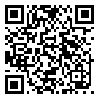Volume 24, Issue 1 (5-2018)
Back to this Issue |
Back to browse issues page
Download citation:
BibTeX | RIS | EndNote | Medlars | ProCite | Reference Manager | RefWorks
Send citation to:



BibTeX | RIS | EndNote | Medlars | ProCite | Reference Manager | RefWorks
Send citation to:
Mojahed K, Navidian A. The effect of motivational interviewing on self-efficacy to quit hookah smoking in pregnant women
. Journal of Hayat 2018; 24 (1) :84-96
URL: http://hayat.tums.ac.ir/article-1-2246-en.html
URL: http://hayat.tums.ac.ir/article-1-2246-en.html
1- Dept. of Midwifery, School of Nursing and Midwifery, Zahedan University of Medical Sciences, Zahedan, Iran
2- Dept. of Psychiatric Nursing, School of Nursing and Midwifery, Zahedan University of Medical Sciences, Zahedan, Iran; Pregnancy Health Research Center, Zahedan University of Medical Sciences, Zahedan, Iran ,alinavidian@gmail.com
2- Dept. of Psychiatric Nursing, School of Nursing and Midwifery, Zahedan University of Medical Sciences, Zahedan, Iran; Pregnancy Health Research Center, Zahedan University of Medical Sciences, Zahedan, Iran ,
Abstract: (4909 Views)
Background & Aim: Waterpipe smoking during pregnancy is a health problem, and interventions must be designed for its cessation. The present study was conducted to examine the effect of motivational interviewing (MI) on self-efficacy to quit hookah smoking in pregnant women.
Methods & Materials: The randomized clinical trial was conducted on 140 pregnant women who smoked hookah and lived in the marginal settlements in Zahedan in 2017. The convenience samples were randomly assigned to intervention and control groups. Data were collected using demographic characteristics and self-efficacy to quit hookah smoking questionnaires. Participants in the intervention received four group sessions of MI, while those in the control only received usual recommendations for quitting hookah smoking. The post-test was performed eight weeks after the completion of the intervention. Independent t-test, paired t-test, Chi-square, and Analysis of Covariance (ANCOVA) were used for data analysis through the SPSS software version 21.
Results: The demographic characteristics and gestational age of women were comparable between two groups, but the duration of hookah consumption in the intervention was more than the control (P=0.008). While the mean score of self-efficacy of two groups in pre-test was alike, in the post-test the score of self-efficacy in the intervention (60.85±7.25) was higher than the control (22.77±3.79) (P<0.001).
Conclusion: Given that MI approach has a positive effect on self-efficacy to quit hookah smoking, it is suggested that this counseling strategy is integrated into health care programs for pregnant women smoking hookah.
Clinical trial registry: IRCT201609240299954N5
Methods & Materials: The randomized clinical trial was conducted on 140 pregnant women who smoked hookah and lived in the marginal settlements in Zahedan in 2017. The convenience samples were randomly assigned to intervention and control groups. Data were collected using demographic characteristics and self-efficacy to quit hookah smoking questionnaires. Participants in the intervention received four group sessions of MI, while those in the control only received usual recommendations for quitting hookah smoking. The post-test was performed eight weeks after the completion of the intervention. Independent t-test, paired t-test, Chi-square, and Analysis of Covariance (ANCOVA) were used for data analysis through the SPSS software version 21.
Results: The demographic characteristics and gestational age of women were comparable between two groups, but the duration of hookah consumption in the intervention was more than the control (P=0.008). While the mean score of self-efficacy of two groups in pre-test was alike, in the post-test the score of self-efficacy in the intervention (60.85±7.25) was higher than the control (22.77±3.79) (P<0.001).
Conclusion: Given that MI approach has a positive effect on self-efficacy to quit hookah smoking, it is suggested that this counseling strategy is integrated into health care programs for pregnant women smoking hookah.
Clinical trial registry: IRCT201609240299954N5
Send email to the article author
| Rights and permissions | |
 |
This work is licensed under a Creative Commons Attribution-NonCommercial 4.0 International License. |






